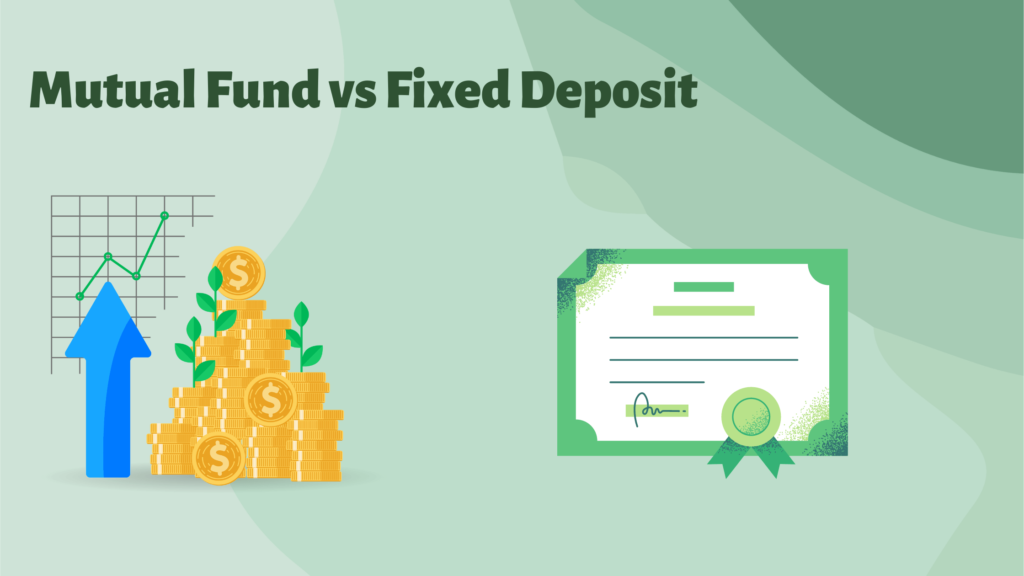Mutual Fund vs Fixed Deposit can be very interesting. A fixed deposit is still regarded as the ideal form of investment by our Elders.
Their understanding of finance indicates that they are in the correct place, but if you can handle more risk, you might want to check at mutual funds.
You’ve searched for this article because you’re interested in the differences and similarities between mutual funds vs fixed deposit.
In this article, I’ll go through each of them, and we’ll also compare investing in mutual funds vs fixed deposits.
in order to comprehend mutual fund vs fixed deposit
Let’s first comprehend their fundamental definition.
What is Mutual Fund?
A mutual fund is a collection of investments in which you can put your money and have it divided among various assets. Each mutual fund has a certain goal in mind while making investments. The mutual fund makes investments in debt, equity, or a mix of the two.
There are additional kinds of mutual funds; you may read more specifically about them here. These funds are managed by profession managers.
What is Fixed Deposit?
In fixed deposits, we make a one-time, lump-sum investment in a bank or an NBFC company. This investment has a set time frame. From a few days to many years, this period might be.
There is really little risk. On your investment, you could make up to 4% to 5% annually.
Similarities: Mutual Fund vs Fixed Deposit
Investment: Investors have the opportunity to make investments in either of them.
Return: We anticipate a return on every investment we make.
Tenures: As investors, we can select the maturity term during which we will receive a return of our primary investment.
Differences: Mutual Fund vs Fixed Deposit
Both possibilities receive the money we have worked so hard to obtain, yet they are different.
In the war of Mutual Fund vs Fixed Deposit, Everyone has heard that mutual funds are hazardous while fixed deposits are safe. Let’s examine their differences and the reasons they pose various risks.
| Fixed Deposit | Mutual Fund | |
| Risk | No Risk | Depends on the market |
| Return | Usually between 4% and 5% annually, fixed rate of return. | Return is not fixed, However, if you invest for the long run, you might anticipate a return of 14–18%. |
| Liquidity | Liquidity is low, You must pay the penalty if you want to withdraw before the contract’s maturity date. | Greater Liquidity, Wherever you choose, you can withdraw money, but in other situations—like ELSS and closed-ended schemes—you cannot. |
| Inflation | Your returns are unaffected by inflation. No matter how much inflation there is, the return is fixed. | Adjustments are done in accordance with inflation because it is dependent on the market. |
| Taxation | You must pay TDS if the interest you earn is greater than Rs. 10,000 per year. | You must pay tax on any profit you make from capital gains. Some mutual fund programmes also provide tax relief. |
| Diversification | No Diversification | Your money is diversified into different financial instruments |
| Cost Involved | You don’t have to pay any cost to invest and claim the money in Fixed Deposit. | An expense cost is involved when you redeem your mutual fund units. |
| Under | RBI (Reserve Bank of India) | SEBI and AMFI |
Question on Mutual Fund vs Fixed Deposit

You need to make a few simple inquiries before investing in any of these assets.
What level of risk can I handle?
What is the smallest amount I can invest?
How long will I continue to invest?
What is the purpose of my investing?
How much do I still owe after my investment has generated a profit?
What Should I Expect from a Fixed Deposit?
The biggest difference between the two investing options is risk, therefore if you don’t like risk A guaranteed rate of return on a fixed deposit can be a fantastic choice for you. Your fixed deposit can be used as collateral for a loan if you need one. You must go to your bank’s main location and request the necessary paperwork in order to begin an FD. You can now open an FD with banks and NBFCs online. The fixed deposit is not erratic on a daily basis. There is no need to track your FD as a result. In order to receive your principal and interest, you must keep in mind the maturity date. You can stay invested in FD for as little as seven days up to a maximum of 10 years.
What Should I Expect from a Mutual Fund?
Although the risk is larger than that of a fixed deposit, you can choose which mutual fund to invest in based on your tolerance for risk. Your money is further invested in debt, equity, or a combination of the two when you put money into a mutual fund plan. A qualified fund manager finds, picks, and analyses the stock that the company will invest in when managing a mutual fund. You own units of mutual fund schemes that have a set price known as NAV.
You can select a mutual fund strategy based on its goals. By understanding the mutual fund schemes’ objectives, you can determine whether to make long- or short-term investments. You can invest in mutual funds by two SIP and Lump-Sum.

Do read our previous article on Why should SIP in Mutual Funds?
Conclusion
You can get a good return on your money if you invest for a very long time. Mutual funds provide diversity by allowing you to invest in a variety of instruments. Consider a fixed deposit if you notice market volatility because it is unaffected by the market.
I’m hoping you can tell a the difference between mutual fund vs fixed deposit
You can now invest with ease having made your decision.
Be clear about your objectives and risk tolerance so you can invest and sleep soundly.
It is crucial to understand all the specifics of investing, whether you choose to invest in a mutual fund vs fixed deposit
Where will you make an investment?
Mutual fund vs Fixed Deposit
If you have any queries in the Mutual Fund and Fixed Deposit do let me know in the comment section.
